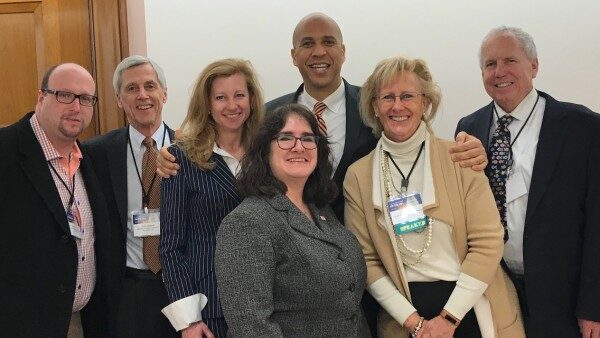
This week hundreds of representatives from private foundations are converging on Capitol Hill to share stories of impact and ask policymakers to consider the implications of tax and policy changes on the essential work of our social sector. Foundations on the Hill brings together grantmakers from across the nation, some representing large billion dollar philanthropies, others small family foundations.
This year Council of New Jersey Grantmakers members from independent, family, and corporate foundations expect to meet with each of New Jersey’s 12 Congressional offices and two Senators. Joining us will be our colleague Linda Czipo, president of the Center for Non-Profits, New Jersey’s leading voice for our state’s charitable organizations.
We have a number of important topics to cover in these meetings.
We want to encourage our representatives to support legislation for a Universal Charitable Deduction, which would expand the tax incentive to everyone one that files a tax return, not just those who are wealthy enough to itemize. With the passage of last year’s Tax Cuts and Jobs Act far fewer Americans will itemize, and therefore claim the charitable tax deduction. This puts at risk billions of dollars in donations needed to ensure thriving communities. The proposed Universal Charitable Deduction would put the deduction “above-the-line,” opening up this incentive to everyone. Think of it as democratizing charitable giving.
We will let them know that we oppose any repeal or changes to the Johnson Amendment, an essential regulation that has successfully kept electioneering OUT of charitable work. For decades, this amendment has protected charities from having to wade into partisan politics. Some claim that not being able to endorse a candidate from the pulpit infringes on free speech. This is not a free speech issue.
Consider, for example, the local Boys and Girls club not endorsing a candidate for reelection to town council, and that candidate then withholding town funding. Or a church that doesn’t want to take a side on a partisan issue. What punishment might the zoning board or tax appraiser be pressured to inflict? This is an important issue that both my organization and the Center for Non-Profits have spoken up about on numerous occasions.
We also expect to speak in support of a fair and accurate 2020 US Census. Because the federal government uses the census information to allocate funding that helps underwrite so many vital social services the philanthropic community cares deeply about this. Most believe the Census is primarily about elected representation in Washington. But its impact and value goes far beyond how many seats in Congress a state receives. It is a critical component of a functioning democracy and a just society. Local and state governments, businesses, nonprofits and, yes, foundations, rely on data to allocate funding, define where services are delivered, and promote economic development. This informs decisions about schools, seniors, veterans, and a host of other community needs. Businesses use the census data to make critical choices about their investments and growth.
When populations are undercounted – as is always the case in hard-to-count communities, including people of color, immigrants, young children, urban and rural low-income – it means less government funding, representation, and private sector investment in those communities. And do you realize that undertaking a census every 10 years is actually one of the very few tasks specifically called for in the US Constitution – it is an important civic obligation. One last thought on the census…if you’ve used Ancestry.com or one of those other online family tree services…you’ve relied on census data.
Philanthropy touches every New Jersey resident every day. We will be sharing stories of philanthropy’s impact and how foundations can be a resource for expertise, best practice and model programs. We will talk about how the nonprofit sector is a job creator, responsible for 10% of the American workforce, making it is the 3rd largest sector in the US behind retail and manufacturing. And we will make sure our policymakers realize that even with all its assets, philanthropy cannot come close to filling gaps when government steps back. The numbers just don’t add up.
These are among the issues and ideas that we’ll be talking about this week during Foundations on the Hill. Wish us luck.
